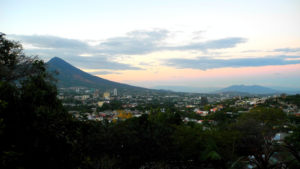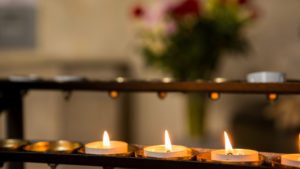Disappearance: Torture without end

On International Day of the Disappeared, CAFOD’s Clare Dixon shares the story of people who worked at the height of the conflict in El Salvador to make sure people killed by death squads did not just disappear without a trace. Sadly, some of the details of this story are distressing.
The first time I visited El Salvador in 1981 the country was plunged in a brutal civil war. Thousands of ordinary men and women were being targeted by the army and death squads, just for demanding their basic human rights, a decent wage, and freedom of speech. Nobody ventured out after dark for fear of being arrested or just snatched off the streets and I felt an overwhelming sense of fear and dread.
Archbishop Romero, the “voice of the voiceless” who had espoused and defended the cause of the poor and oppressed, had been shot dead as he said Mass in 1980. A year later I was visiting El Salvador to meet with members of his Archdiocese who, with the support of CAFOD, had set up a human rights office. Its task was to provide legal aid to help and comfort the countless victims of violence who had nowhere else to turn when their loved ones had “disappeared” after being captured by the death squads.
Please pray for those struggling in El Salvador
At day break every morning, the workers and lawyers of the human rights office searched the ravines and rubbish heaps where the death squads dumped their tortured victims overnight, to take photographic records of all the dead.

These photographs were held in a scrapbook at the Archdiocese and day after day, the mothers and wives of the victims would turn up to search for their lost loved ones amongst these images of the dead. The sobs of the mothers as they recognised the tortured bodies of their sons and daughters were heart-breaking. But at least, they had some relief from the knowledge that their loved ones were now beyond pain.
I met a group of women, young, middle-aged and elderly who would gather every day in the courtyard of the Archdiocese. All of them had their own story of loss to tell. One of them, Elisa, told me how several members of her family, her husband, her daughter and then her son had been captured, imprisoned, killed or had simply “disappeared”. Then it was her turn: she had been grabbed by a group of men, bundled into the back of a pick-up truck and driven to the outskirts of town. Between sobs she told me she was gang-raped. Her companions took up her story: her captors chopped off one of her breasts with a machete, riddled her belly with bullets and left her for dead. But Elisa’s screams alerted a family who lived near to where she was dumped, and by some miracle she survived.
Now, her life, and those of her companions at the Archdiocese, was dedicated to providing support, comfort and consolation to others, like her, whose families had been caught up in the repression and violence.
Read more about our work in El Salvador
But worst of all for Elisa and her friends was the anguish and ongoing torment of not knowing what fate had befallen their loved ones, those whose bodies had never appeared in the Church files. There was no end to their suffering because they could not mourn or visit a grave. In a cruel twist an enforced disappearance could not even be reported as a crime through lack of a body or any evidence.

In July 2002, the International Criminal Court ruled that, when committed as part of a widespread or systematic attack directed at any civilian population, a “forced disappearance” qualifies as a crime against humanity and, thus, is not subject to a statute of limitations. In other words, it is torture without end.
Your donations help support our peacebuilding work around the world